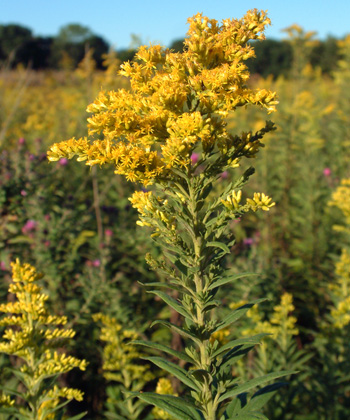Contents:
Common Names | Parts Usually Used | Plant(s) & Culture | Where Found | Medicinal Properties | Biochemical Information
Legends, Myths and Stories | Uses | Warning
Scientific Names

- Salidago odora L.
- Compositae
- Composite family
Common Names
- Anise-scented goldenrod
- Blue mountain tea
- Bohea-tea
- Common goldenrod
- Sweet goldenrod
- Wound weed
Parts Usually Used
Leaves and flowers, dried
Back to Top
Description of Plant(s) and
Culture
The creeping rootstock of this perennial plant produces a slender, simple stem growing to a height of 2-4 feet. The leaves are sessile, thin, entire, lanceolate, and covered with transparent dots. The alternate leaves grow on lower parts of the stem; they are smooth, stalkless, long and narrow. (Not toothed, but tiny prickles catch the skin when rubbed backward along the edge of the leaf). The golden-yellow flower heads appear crowded on arching branches on the upper part of the stem, in terminal panicled racemes from July to September. This species has strongly anise-scented leaves that can be made into a pleasant beverage tea.
Other varieties: Gray goldenrod (S. nemoralis), European goldenrod (S. virgaurea), Canada goldenrod (S. canadensis), there are 80 species.
Back to Top
Where Found
Sweet goldenrod can be found in dry, sandy soils in the eastern half of the United States. Dry open woods, heathland, hillsides, and fields, from New England to Florida, west to Missouri and Texas.
Back to Top
Medicinal Properties
Astringent, carminative, diaphoretic, diuretic, stimulant
Back to Top
Legends, Myths and Stories
Nearly 100 members of the species of Solidago are centered in North America, especially the eastern United States.
Back to Top
Uses
Warm sweet goldenrod tea has diaphoretic properties; taken cold it stimulates the system and helps to dispel flatulence. A tea made from the dried leaves and flowers is an aromatic beverage and can be used to improve the taste of other medicinal preparations. Native Americans applied a lotion made from goldenrod flowers to bee stings. Promotes sweating in fevers. An infusion of flowers has been used to treat kidney gravel and dropsy. A digestive stimulant. Used for colic, to regulate menses, cystitis, colds, coughs, dysentery, diarrhea, measles; externally, a wash for rheumatism, neuralgia, headaches. Externally, treats old sores, wounds, sores or ulcers in the mouth.
Culpeper says use of this herb will “fasten the teeth that are loose in the gums.”
Back to Top
Warning
May cause allergic reactions.
Back to Top
Bibliography
![]() The Herb Book
The Herb Book, by John Lust, Bantam Books, 666 Fifth Avenue, New York, NY. copyright 1974.
![]() Chinese Medicinal Herbs
Chinese Medicinal Herbs, compiled by Shih-Chen Li, Georgetown Press, San Francisco, California, 1973.
![]() Culpeper’s Complete Herbal & English Physician: Updated With 117 Modern Herbs
Culpeper’s Complete Herbal & English Physician: Updated With 117 Modern Herbs, by Nicholas Culpeper, Meyerbooks, publisher, PO Box 427, Glenwood, Illinois 60425, 1990, (reprint of 1814)
![]() The Herbalist Almanac
The Herbalist Almanac, by Clarence Meyer, Meyerbooks, publisher, PO Box 427, Glenwood, Illinois 60425, copyright 1988, fifth printing, 1994
![]() Eastern/Central Medicinal Plants
Eastern/Central Medicinal Plants, by Steven Foster and James A. Duke., Houghton Mifflin Company, 215 Park Avenue South, New York, NY 10000
![]() The Nature Doctor: A Manual of Traditional and Complementary Medicine
The Nature Doctor: A Manual of Traditional and Complementary Medicine, by Dr. H.C.A. Vogel; Keats Publishing, Inc., 27 Pine Street (Box 876) New Canaan, CT. 06840-0876. Copyright Verlag A. Vogel, Teufen (AR) Switzerland 1952, 1991
 The Magic of Herbs
The Magic of Herbs, by David Conway, published by Jonathan Cape, Thirty Bedford Square, London, England. (Out of print)
![]() The Complete Medicinal Herbal
The Complete Medicinal Herbal, by Penelope Ody, Dorling Kindersley, Inc, 232 Madison Avenue, New York, NY 10016, First American Edition, copyright 1993
![]() Planetary Herbology
Planetary Herbology, by Michael Tierra, C.A., N.D., O.M.D., Lotus Press, PO Box 325, Twin Lakes. WI 53181., Copyright 1988, published 1992
![]() American Folk Medicine
American Folk Medicine, by Clarence Meyer, Meyerbooks, publisher, PO Box 427, Glenwood, Illinois 60425, 1973
![]() Indian Herbalogy of North America
Indian Herbalogy of North America, by Alma R. Hutchens, Shambala Publications, Inc., Horticultural Hall, 300 Massachusetts Avenue, Boston, Massachusetts 02115, 1973
 How Indians Use Wild Plants for Food, Medicine & Crafts
How Indians Use Wild Plants for Food, Medicine & Crafts, by Frances Densmore, Dover Publications, Inc., 180 Varick Street, New York, NY 10014, first printed by the United States Government Printing Office, Washington, in 1928, this Dover edition 1974
![]() Webster’s New World Dictionary
Webster’s New World Dictionary, Third College Edition, Victoria Neufeldt, Editor in Chief, New World Dictionaries: A Division of Simon & Schuster, Inc., 15 Columbus Circle, New York, NY 10023
 An Instant Guide to Medicinal Plants
An Instant Guide to Medicinal Plants, by Pamela Forey and Ruth Lindsay, Crescent Books (January 27, 1992).
 The Rodale Herb Book: How to Use, Grow, and Buy Nature’s Miracle Plants (An Organic gardening and farming book)
The Rodale Herb Book: How to Use, Grow, and Buy Nature’s Miracle Plants (An Organic gardening and farming book), edited by William H. Hylton, Rodale Press, Inc. Emmaus, PA, 18049., 1974
 The Healing Plants
The Healing Plants, by Mannfried Pahlow, Barron’s Educational Series, Inc. 250 Wireless Blvd., Hauppauge, NY 11788, 1992
